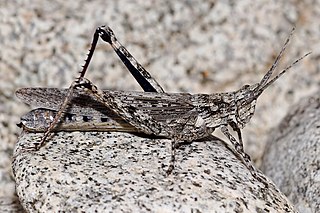
The Acrididae are the predominant family of grasshoppers, comprising some 10,000 of the 11,000 species of the entire suborder Caelifera. The Acrididae are best known because all locusts are of the Acrididae. The subfamily Oedipodinae is sometimes classified as a distinct family Oedipodidae in the superfamily Acridoidea. Acrididae grasshoppers are characterized by relatively short and stout antennae, and tympana on the side of the first abdominal segment.

Bandwings, or band-winged grasshoppers are the subfamily Oedipodinae of grasshoppers classified under the family Acrididae. They have a worldwide distribution and were originally elevated to full family status as the Oedipodidae. Many species primarily inhabit xeric weedy fields, and some are considered to be important locusts:

The grasshopper subfamily Acridinae, sometimes called silent slant-faced grasshoppers, belong of the large family Acrididae in the Orthoptera: Caelifera.
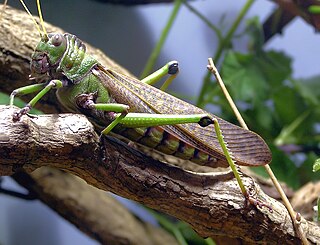
The Romaleidae or lubber grasshoppers are a family of grasshoppers, based on the type genus Romalea. The species in this family can be found in eastern Asia and the Americas.

The Phaneropterinae, the bush katydids or leaf katydids, are a subfamily of insects within the family Tettigoniidae. Nearly 2060 species in 85 genera throughout the world are known. They are also known as false katydids or round-headed katydids.
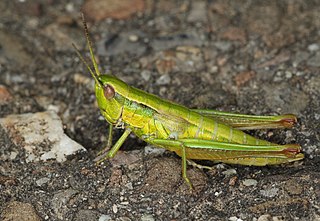
Gomphocerinae, the slant-faced grasshoppers, are a subfamily of grasshoppers found on every continent but Antarctica and Australia.

Pyrgomorphidae is a family of grasshoppers in the order Orthoptera; it is the only family in the superfamily Pyrgomorphoidea, with a pan-tropical distribution. Their name is probably derived from pyrgos meaning "tower": a reference to the form (morph) of the head in the type genus Pyrgomorpha and other genera.
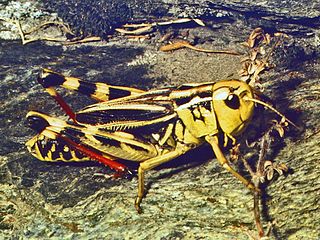
Arcyptera is a genus of 'short-horned grasshoppers' belonging to the family Acrididae subfamily Gomphocerinae. These grasshoppers are present in most of Europe, in the East Palearctic ecozone and in the Near East.
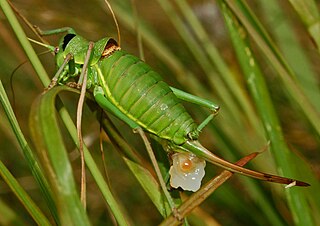
The Bradyporinae are a subfamily in the family Tettigoniidae. Although this subfamily, based on the type genus Bradyporus dates from "Bradyporidae", the first use, as Bradyporinae, was by Brunner von Wattenwyl.

Eumastacidae are a family of grasshoppers sometimes known as monkey- or matchstick grasshoppers. They usually have thin legs that are held folded at right angles to the body, sometimes close to the horizontal plane. Many species are wingless and the head is at an angle with the top of the head often jutting above the line of the thorax and abdomen. They have three segmented tarsi and have a short antenna with a knobby organ at the tip. They do not have a prosternal spine or tympanum. Most species are tropical and the diversity is greater in the Old World. They are considered primitive within the Orthoptera and feed on algae, ferns and gymnosperms, the more ancient plant groups.

Chorotypidae is a family of tropical Asian grasshoppers. These grasshoppers have a head that rises above the level of the thorax and short antennae. Some species have reduced wings, others have wings that widen towards the tips and still others have a flattened leaf-like shape. They lack abdominal tympani.

Proscopiidae is a family of Neotropical grasshoppers, now placed in its own superfamily, the Proscopioidea. Some species may be known as stick grasshoppers or jumping sticks.

Oxyinae is subfamily of grasshoppers in the family Acrididae. Species are distributed throughout Africa and Australasia.
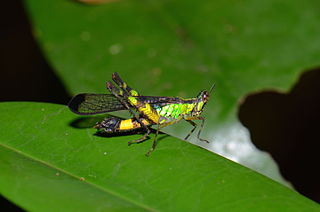
Erianthus is a genus of grasshoppers restricted to Southeast Asia. They occur in Japan, northeast India, Myanmar, Thailand, Vietnam, South China including Hong Kong, and extend east to Sumatra. In the past some neotropical species were also included in the genus. They have narrow ranges and species are identifiable only by their characteristics of male and female genitalia.

Myrmeleotettix is a genus of grasshopper in the tribe Gomphocerini.

The Eyprepocnemidinae are a subfamily of Acrididae in the Orthoptera: Caelifera. Species can be found in Africa, mainland Europe and Asia.
Turpilia is a genus of phaneropterine katydids in the family Tettigoniidae. There are about nine described species in Turpilia.

Copiocerinae is a subfamily of short-horned grasshoppers in the family Acrididae. There are at least 20 genera in Copiocerinae, found in southern North America, Central America, and South America.

Caedicia is a genus of bush cricket in the subfamily Phaneropterinae. Species can be found Australasia, with records from Vietnam, PNG and Australia.
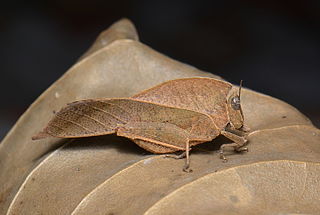
Chorotypus is a genus of Asian grasshoppers in the family Chorotypidae; species can be found in: India, Indo-China and Malesia.






















